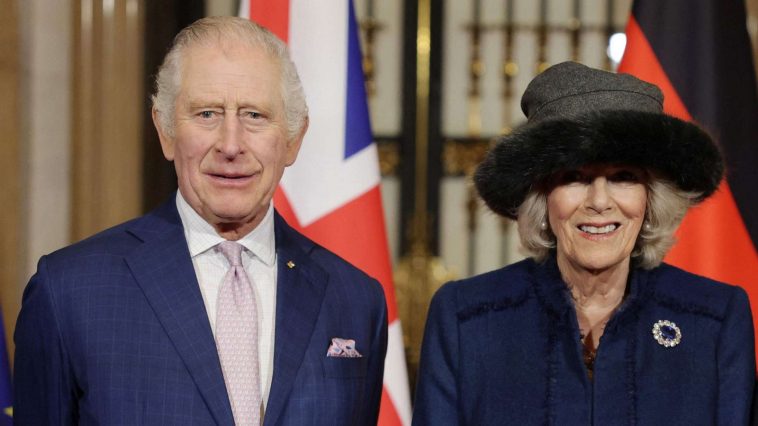LISTEN HERE:
May 6, 2023, marked the coronation of King Charles III, but President Biden maintained a longstanding American custom by not participating in the event himself. However, the decision to have First Lady Jill Biden represent him deviated significantly from over a century of established practice, according to experts. For the 247 years since the United States gained independence from Britain, no sitting president has attended the crowning of a British monarch.
Initially, this absence could be attributed to the logistical challenges of international travel. While anti-British sentiment had subsided by 1821 when George IV succeeded his father George III, it was still a daunting task for a president to embark on a lengthy overseas journey. It wasn’t until Woodrow Wilson’s presidency in 1918 that a U.S. president ventured across the Atlantic while in office.
As steamships were introduced in the early 20th century, it quickly became common for the U.S. to send official delegations to coronations. These carefully selected representatives were tasked with promoting the administration’s priorities during the festivities. Indeed, since George V’s ascension to the throne in 1911, various American presidents have dispatched such delegations to support their agendas.
??First Lady of the United States Jill #Biden with her granddaughter Finnegan Biden showed support and solidarity for #Ukraine with the colors of their outfits at the coronation ceremony of King #CharlesIII pic.twitter.com/gfcEwyZ07d
— KyivPost (@KyivPost) May 6, 2023
For instance, during George VI’s 1937 coronation, President Franklin D. Roosevelt dispatched General John J. Pershing and outspoken Hitler critic James Gerard as his ambassadors. Their mission was to encourage others to join the United States’ impending battle against fascism. Such moments in history indicate that the delegation selection process was of great importance to past U.S. presidents.
President Biden’s decision to send his wife, Dr. Jill Biden, as his sole representative marks a notable departure from tradition. Although First Lady Biden is attending the coronation as a guest and will be accompanied by Finnegan Biden, the granddaughter of the President; there is no formal delegation or announced agenda.
In 1953, during Elizabeth II’s investiture, President Dwight D. Eisenhower invested significant time and effort in assembling his delegation. He sought to strengthen ties established during World War II by sending military heroes George Marshall and Omar Bradley. Furthermore, Eisenhower selected socialite publisher Fleur Cowles to exemplify the aspirations of a rising generation of postwar working women.
In comparison with previous administrations, it seems that President Biden has not given the same attention and consideration to the coronation of King Charles III. While Jill Biden’s attendance is not deemed a snub, some experts argue that it demonstrates a lower prioritization compared to previous presidents.
Arianne Chernock, a history professor at Boston University who studies the relationship between the United States and the British monarchy, described the situation by saying, ‘This is not a snub. But Joe Biden clearly hasn’t made it a high priority, as past presidents have done.’
As the details surrounding Jill Biden’s visit remain sparse, questions of intent arise. Is she simply there to pay her respects or engage in more informal discussions? The answer to such questions will only become evident as the event unfolds; however, the lack of a formal delegation remains significant.
President Biden’s decision not to attend the coronation can also be viewed as a nod to the conservative demographic in the United States. By sidestepping the role historically undertaken by previous presidents, he demonstrates that the United States maintains a degree of independence from the British monarchy, a notion valued by many conservative Americans.
Additionally, this move may signal Biden’s focus on domestic issues rather than international diplomacy. Many conservative Americans prioritize addressing problems within the U.S. and by not allocating significant resources toward the coronation, Biden could be signaling his administration’s attention to these concerns.
The role of the U.S. in international affairs has often been a point of contention among conservatives. In this situation, Biden seems to walk a fine line between maintaining diplomatic relations with an important ally and not committing too many resources to the pomp and circumstance surrounding a royal coronation.
It’s notable that Biden’s break from tradition in sending Jill Biden without a formal delegation could be seen as a way to demonstrate a more modern and less elitist approach to the relationship between the U.S. and the British monarchy. This view may appeal to conservative Americans who emphasize the importance of humility and approachability in leadership.
Moreover, Biden may be attempting to underscore the notion of strong family values by choosing his wife and granddaughter to attend the event. Family values have traditionally resonated with conservative Americans, and this example might also serve to soften the criticism surrounding his embattled son, Hunter.
Ultimately, only time will tell the impact of President Biden’s decision to send Jill Biden as his representative to the coronation of King Charles III. While it may not be a direct snub, the departure from traditional protocol does highlight a subtle shift in priorities and acknowledges the values of the conservative demographic in the United States.


